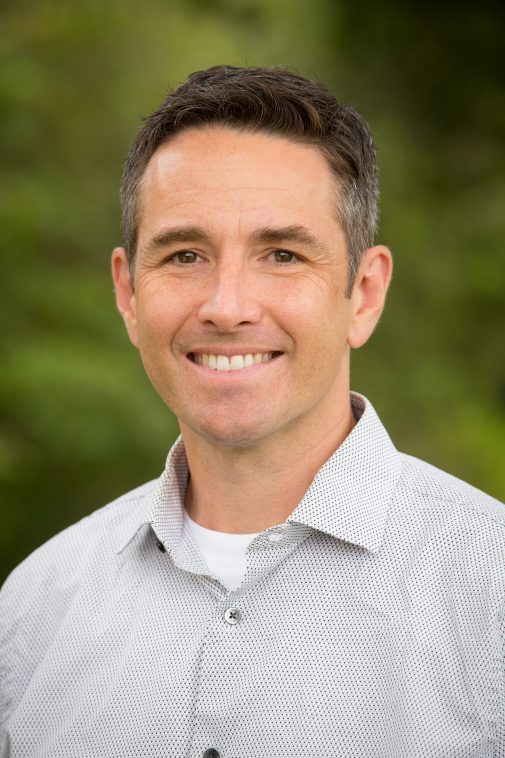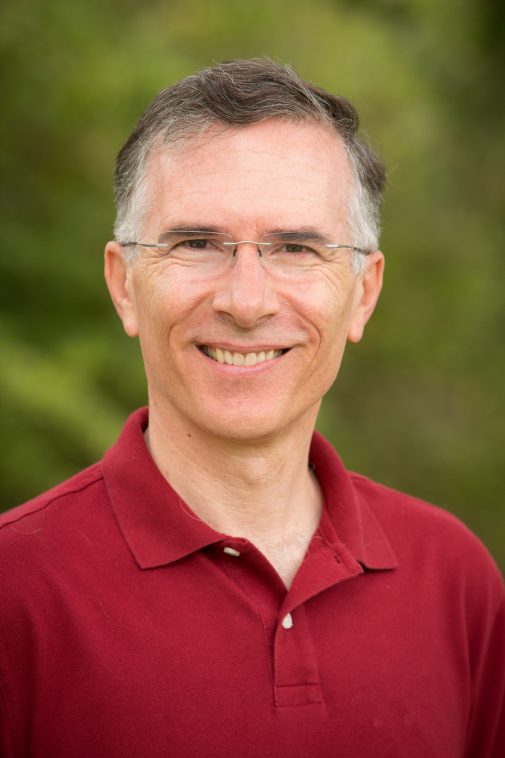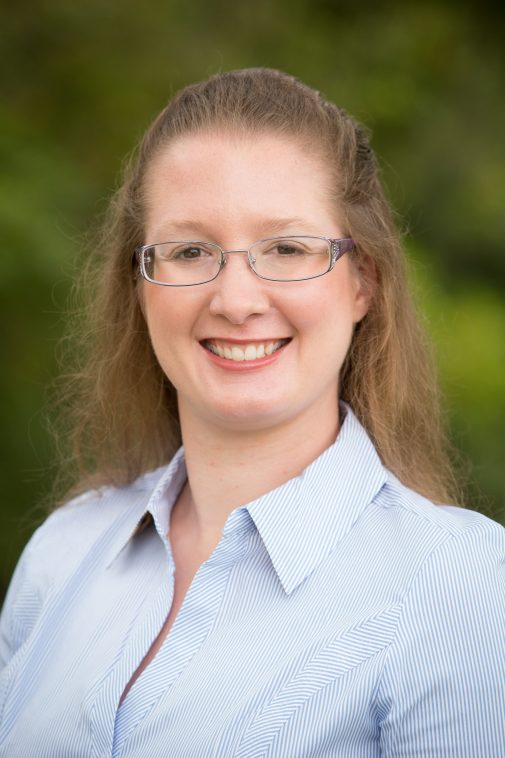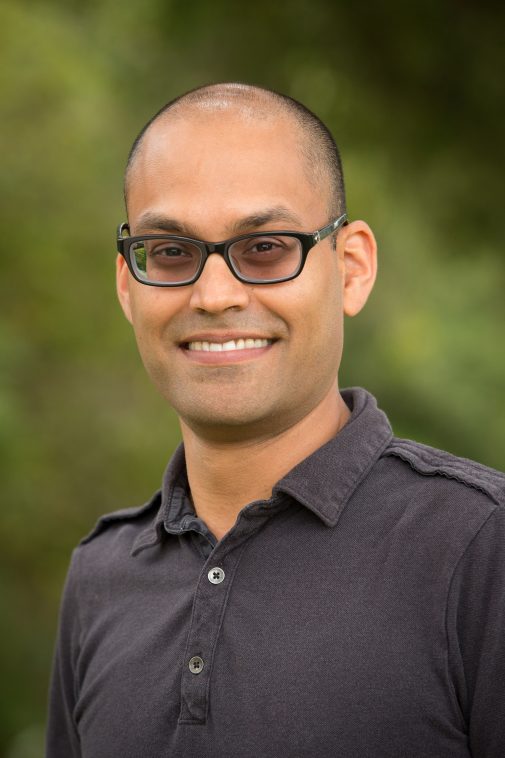Four Top Scholars Join Westmont Faculty
By
Westmont

Four new talented professors joined the Westmont faculty this fall. Donald Patterson (computer science), Ronald See (psychology), Amanda Silberstein (chemistry) and Sameer Yadav (religious studies) arrived in August and have begun teaching.
Patterson, who taught at UC Irvine last semester, earned bachelor’s and master’s degrees at Cornell University before serving as a naval operations officer for four years in Japan and Sardinia. “It was in our family DNA,” he says. “My dad was in the Navy, my uncle was in the Navy, both my grandfathers were in the Navy, so it was not a strange thing for us.”
He earned a doctorate from the University of Washington and received multiple grants and won awards for articles on collapse informatics and abstract object usage. “I was interested in computers back in elementary school,” he says. “I saw both the operational side of computers when I was in the military and then I went back to grad school and focused on the development and forward-looking side.”
Among his many scholarly interests are ubiquitous computing, human-computer interaction and artificial intelligence. “I’m interested in the way that intelligent user interfaces can change how we operate with each other at a social and organizational level,” he says. “In particular, I’m interested in sustainability and looking at developing world situations that can use technology in innovative ways to expand infrastructure and access. I’m looking at our future in terms of environmental and global change seeing how we can prepare now by developing computer systems to increase our resilience.”
See, who is teaching primarily in the area of neuroscience, graduated from UC Berkeley before earning a master’s and doctorate at UCLA. He has held long-term academic appointments at the Medical University of South Carolina and at Washington State University. Most recently, he taught for three years in the Department of Internal Medicine at the University of Tabuk in Saudi Arabia.

“God has given my wife and me exciting opportunities as Christians to use our abilities and training to go into places where others often cannot, particularly within the Muslim world,” he says. “We were in a remote area of Northern Saudi Arabia, teaching and helping in the development of a medical school. We lived there as professionals, but with a conspicuous Christian testimony within that context to our colleagues and neighbors.”
See has extensive international experience, serving as a Fulbright Lecturer at the University of Ljubljana in Slovenia, a visiting fellow at Oxford University, and twice as a visiting professor at Kuwait University. As an undergraduate, he also studied for a year at Georg-August University in Germany.
See has been the principal investigator or co-investigator on 16 grants from the National Institutes of Health and the primary author or contributing author on more than 150 scholarly articles.
“Over the last 25 years, I developed a research program focused on the neurobiology of drug addiction, particularly the factors that drive the process of relapse in addiction,” he says. “We have studied a number of factors related to brain neurochemistry and brain circuits altered by addictive drugs, with the goal of developing treatment interventions, particularly those that might break the cycle of addiction.”
A member of more than 30 dissertation committees and hundreds of student projects, See has long worked with students in research training. “I look forward to greater integration of my Christian faith and the discipline of neuroscience,” he says. “This Christian liberal arts environment at Westmont is exciting to me after having worked many years in the secular world and to now be in a place where Christ holds preeminence.”
Silberstein, a graduate of Caltech who earned a doctorate at UCLA, became familiar with Westmont through her sister, Megan, who graduated in 2014 with a bachelor’s degree in music. “I visited on weekends and went to her music events,” Amanda says. “I told her years ago that I could see myself living in Santa Barbara; it’s a wonderful place.”

As a postdoctoral scholar at Caltech, she examined the effectiveness and toxicity of polyamides targeting liver cancer in cell culture. Silberstein won numerous fellowships during her graduate studies and served as an intern at Genentech in San Francisco and worked as a lab scientist for Advion Biosciences in Ithaca, New York.
“Chemistry is my family business,” she says. “My grandfather and my uncles are all chemists, and some of my earliest memories are of my grandfather taking me out at night to point out constellations or planets in the night sky. I was probably the only 5-year-old who knew the phases of the moon. I developed an early interest in science and that directed my career path in college and beyond.”
At Westmont, she will focus her research on synthetic chemistry. “I’ll be working on methodology development and hopefully in the future working to total synthesis, making naturally occurring small molecules.”
She is enthusiastic about integrating faith into her sessions. “Having a largely secular education, I am looking forward to bringing my faith into my work, examining it for myself and demonstrating for students the interplay between Christianity and science.”
Yadav was born and raised Hindu in Idaho with parents who emigrated from India. “Hindu in Idaho— sounds like a sitcom,” he says. “My conversion occurred in my senior year of high school/first year of college, and I have an identical twin brother who is now a pastor. He and I are the only Christians in our family; it was his conversion that led me to the Lord.”

This unique upbringing gives Yadav an interesting perspective on how Christians think about God’s presence in the world. “All Christians believe that God is omnipresent, so He’s everywhere, but there’s a sense in which God’s being everywhere has the paradoxical consequence that God seems to be nowhere,” he says. “It’s difficult to say what we mean when we talk about God’s presence in a locale given that God’s presence is global.”
Yadav graduated from Boise State University before completing master’s degrees from the Master’s Seminary and Yale Divinity School. He earned a doctorate at Duke, focusing on systematic and philosophical theology, with secondary concentrations in the Hebrew Bible and moral theology. His book, “The Problem of Perception and the Perception of God” (Fortress Press, 2015), addresses philosophical issues in how we ground Christian belief and practice.
“From early on in the church’s history, theologians have thought a lot about experiencing God – what it might be like to experience God and how to describe experiences of meeting God,” he says. “My book and my work merge different disciplines, mainly in the philosophy of mind and the early Christian mystical tradition, to articulate a contemporary way of thinking about how to describe God’s presence to us.”
He is working on a book about Gregory of Nyssa, a fourth‐century Cappadocian Eastern church father. “He is well known for developing what has been called the theology of the spiritual senses, to describe the unique sensitivities that we as humans have toward God,” he says. “Clearly we have unique sensitivities toward physical things, such as seeing light in a particular way. But Christians suppose that we also have some kind of sensitivities toward God. What are those like? How do they work? How do you train those faculties to become capable of “tuning in” to God’s presence?”
Yadav most recently served as a postdoctoral fellow in the John Wesley Honors College of Indiana Wesleyan University.
Filed under
Academics, Admissions, Faculty and Staff, Press Releases